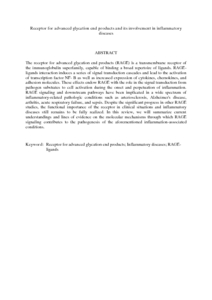Citation
Chuah, Yaw Kuang and Basir, Rusliza and Talib, Herni and Tie, Tung Hing and Nordin, Norshariza
(2013)
Receptor for advanced glycation end products and its involvement in inflammatory diseases.
International Journal of Inflammation, 2013.
art. no. 403460.
pp. 1-15.
ISSN 2090-8040; ESSN: 2042-0099
Abstract
The receptor for advanced glycation end products (RAGE) is a transmembrane receptor of the immunoglobulin superfamily, capable of binding a broad repertoire of ligands. RAGE-ligands interaction induces a series of signal transduction cascades and lead to the activation of transcription factor NF- B as well as increased expression of cytokines, chemokines, and adhesion molecules. These effects endow RAGE with the role in the signal transduction from pathogen substrates to cell activation during the onset and perpetuation of inflammation. RAGE signaling and downstream pathways have been implicated in a wide spectrum of inflammatory-related pathologic conditions such as arteriosclerosis, Alzheimer's disease, arthritis, acute respiratory failure, and sepsis. Despite the significant progress in other RAGE studies, the functional importance of the receptor in clinical situations and inflammatory diseases still remains to be fully realized. In this review, we will summarize current understandings and lines of evidence on the molecular mechanisms through which RAGE signaling contributes to the pathogenesis of the aforementioned inflammation-associated conditions.
Download File
![[img]](http://psasir.upm.edu.my/29691/1.hassmallThumbnailVersion/Receptor%20for%20advanced%20glycation%20end%20products%20and%20its%20involvement%20in%20inflammatory%20diseases.pdf)  Preview |
|
PDF (Abstract)
Receptor for advanced glycation end products and its involvement in inflammatory diseases.pdf
Download (84kB)
| Preview
|
|
Additional Metadata
Actions (login required)
 |
View Item |

